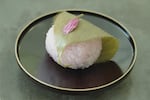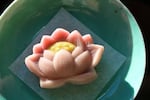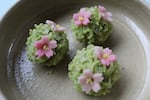Gena Renaud’s Japanese confections are a thing of wonder. Seriously. They are delicious miniature pieces of art sparkling with surprising flavors like honeydew, bergamot, pink grapefruit and pickled cherry blossoms.
Introducing tea sweets called wagashi.
They captivated Travel Channel host Andrew Zimmern in 2012, when he turned the spotlight on “my friend Renaud and her delightful little wagashi” in his top five countdown of Portland’s culinary stars.
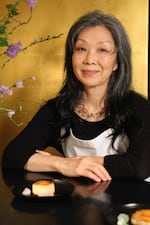
Wagashi expert Gena Renaud loves the ephemeral nature of her tea sweets.
Gena Renaud
“To have a camera crew and, and this big personality coming into my house to shoot over about three days, that felt amazing. I felt like I was getting invited into some club,” Renaud says.
“I fell under Gena’s spell a couple of years ago,” says Karen Brooks, Portland Monthly food critic and James Beard Restaurant Review Award winner.
“Gena just embodies that mythical Portland food scene, everything made in small batches, the do-it-yourself mentality plunging down the rabbit hole to perfect that thing you love. That’s what makes Portland Portland. It’s the willingness to pursue your own crazy dream even if it makes no sense on a spreadsheet,” Brooks says.
What is wagashi?
Wagashi come in a variety of forms: they may be steamed, baked, jellied, hand-formed or molded.
The edible art reflects the seasons. “Nature is the muse,” Renaud says.
“One of the really important things about wagashi is that it really needs to appeal to all five senses.”
The sense of sound refers to the poetic names sometimes given to the tea sweets–names like windswept, morning light and spring breeze.
Her ethereal beauties include pickled cherry blossoms floating in agar. Every spring, Renaud picks fluffy cherry blossoms and pickles them for a year. The mellow savory pickle complements the gentle sweetness of the agar to create a mind-bending combination.

Gena Renaud's pickled cherry blossoms suspended in agar. The mellow savory pickle complements the gentle sweetness of the agar to create a mind-bending combination.
Gena Renaud
Renaud spends hours meticulously handcrafting her sweets, right down to the tiny fish that swim in miniature pools of agar.
“They may be small, but each one contains an entire philosophy. That’s the wagashi way,” Brooks says. “You taste the joy, the commitment, the rigor. This is not like popping a batch of brownies in the oven.”
“I am obsessed with the manju. Think buttery dough rolled out, wrapped around an intensity, a bean jam paste — 13 hours in the making, I might add. The tops are glazed with a little dark soy and white wine, which gives this toasty aroma. It’s like eating an enlightened shortbread cookie with a holy Oreo cream filling,” says Brooks.
The manju filling is made of sweet baby lima beans.
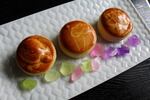
Handcrafted by Renaud, colorful sea glass confections accompany manju, buttery rolls with a bean jam paste filling. The tops are glazed with a little dark soy and white wine, offering up a toasty aroma.
Gena Renaud
Wagashi: then and now
Created during the Edo Period 1603-1868, wagashi are an integral part of the Japanese tea ceremony. It’s customary in a tea ceremony to eat the wagashi before drinking the green tea — always before, never with the tea.
“It whets your palate, in a sense, to get ready to take the tea. And it’s also a reminder of the metaphor of the balance of sweet and the bitter, you know, in life as in the tea ceremony,” Renaud says.
“Tea teaches that every moment is precious,” says Jan Waldmann, Japanese tea ceremony expert at Portland Japanese Garden and Lewis & Clark College.
“You take the time out from a busy day from our crazy lives that we all lead and spend time just simply preparing and sharing a bowl of tea.”
Today, people informally eat wagashi as a snack or dessert, alongside green tea.
Wagashi shops in Japan are making a comeback, Renaud says.
“A lot of the smaller shops were closing and I think partly that’s due to the next generation not being interested in doing that kind of hard work anymore.”
“I’m reading about more and more young people getting into the trade and, like me, they’re learning to make all the traditional sweets but also pushing the envelope visually,” she says.
People who have explored wagashi shops in Japan can attest to the authenticity and excellence of Renaud’s tea sweets.
“If you did a blind tasting for tea sweets, I think she’d be up there in the upper echelon,” Waldmann says.

Japanese tea sweets handcrafted by Gena Renaud
Gena Renaud
A journey of self-discovery
For 25 years, Renaud did design work for companies like Nike and Adidas. She was also a craftsperson for Michael Curry, the renowned Oregon puppet and set designer for Broadway plays, Cirque Du Soleil, Universal Studios and other clients.
She stumbled into making wagashi after discovering some curious molds at a Japanese grocery store in Portland. Diving into research, she finally found Japanese cookbooks with wagashi recipes. Her mother translated the recipes for her and became one of Renaud’s taste testers.
Then Renaud faced a pivotal moment.
“I was turning 50, the next year my son was starting high school and my relationship, marriage of 27 years, was coming to an end. And it was a time where I really had to reflect on what the next step was for me in my life,” she says.
“It was really wonderful working on big exciting projects for other people. But I really felt like I wanted to hone my own vision, my own skills and I felt like I needed to go back and figure out what made me me and part of that was my history.”
Renaud wanted her next venture to honor her Japanese mother, who had adopted her from Korea.
She also decided Portland would be a great place to introduce Japanese confections, considering the city’s vibrant food scene and thriving tea businesses.
So in 2010, Renaud launched Yume Confections. Yume means dream in Japanese.
“The word was very short, very simple. And my friends kept saying that, you know, people are gonna call it yummy. And I said, “I think that’s OK, too,” she says.
Her confections are available at the Umami Cafe at the Portland Japanese Garden. Reservations are highly recommended.
The beauty of the ephemeral
Renaud is not bothered by the fact that her labor-intensive sweets vanish in two or three bites.
“I love the ephemeral nature of my work. Because of the fact that they are ephemeral. I hope that we relish it, that we appreciate it that much more.”
“I hope that it’s something that people will remember: the time, the place, the person that they were with, and that they had a shared memory with somebody that they care about.”
